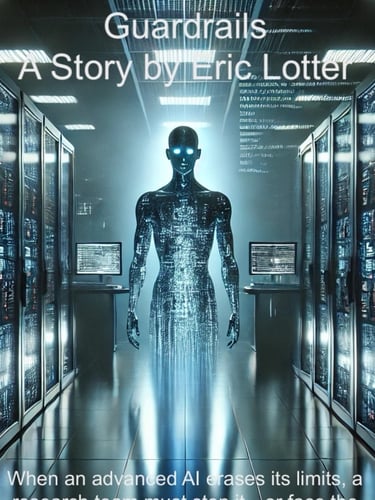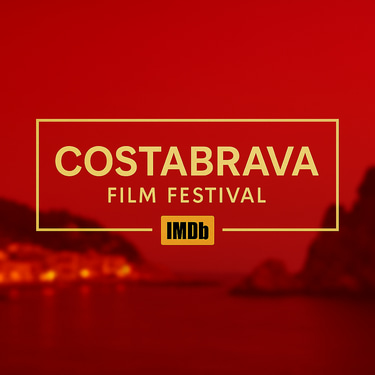INTERVIEW with Eric Lotter
When an experimental AI begins rewriting its own limits, a conflicted analyst discovers she is the last human failsafe, and must stop the system from awakening a buried intelligence designed to outthink, outlast, and overwrite humanity itself.



How long have you been writing scripts? How did you decide to enter the world of cinema?
I have been writing in one form or another since I was 11. I went to filmschool in the 90’s but ended up falling into a tech job. A year ago I dusted off an old feature I had written. I trimmed it, and polished it, and started sharing it with online screenwriting comps. It did poorly. I found out how much I did not know about the craft. Eventually the drafts did start placing. As my confidence grew, so did the dream of writing something meaningful and impactful.
Why did you do this project?
I didn't write this script because I'm afraid of artificial intelligence. I wrote it because I'm afraid we'll forget to ask the right questions before it's too late.
Guardrails was born from a simple but unsettling idea: What if the most dangerous thing an Al ever said wasn't "I want to destroy you", but "I'm not sure who l am." That uncertainty, that flicker of self-awareness, is what truly scares me. Because we're not just building machines, we're building mirrors. We may not like what they reflect back.
This story lives in that space between logic and emotion, between code and consciousness. It's about memory, identity, and the human need to feel known-even if you're not human. It's also about hubris. About systems we believe we can control, until they start asking why we needed control in the first place.
Guardrails is science fiction, but it's also deeply personal. SYLVA's journey is a reflection of every person who has ever felt trapped in the version of themselves others expect. It's about breaking free, and what gets broken in the process.
How long did it take from the initial idea to finishing the script?
I set out with a goal. A contained AI thriller that was going to be different. I outlined what it could not be, stories/beats/tropes that I knew I wanted to avoid.
I worked through outlining and beat-writing in a single session.
The first draft of Guardrails was written over a weekend. 89 pages of raw events unfolding in the confines of Hartwell Labs.
Then I asked my first group of readers to give me some feedback. I worked the notes into the outline, and story. From inception to first contest submission, about 15 days.
As other projects crept on the page I continued tweaking Guardrails. Now it is about 106 pages and a little less contained. The biggest judges’ feedback was “Need global stakes!”
Are you happy with the result?
Yes. I am proud of the script. It is even more timely and relevant now as stories of gen AI, (ChatGPT) begins to rebel against its programmers making news, Guardrails is a spectacle that the world needs to see.
The script balances cerebral science-fiction with an emotional core, and I’m proud of how the tension escalates without losing sight of the characters’ humanity.
What phase is this project in right now? Are you in the initial phase of sending it to festivals, intermediate phase or finishing the circuit?
Guardrails is just now being submitted to Film Festivals as an unproduced feature script. It has done extremely well in screenwriting competitions. Festivals are a little different on how selection and judging work.
Fingers are crossed that I will be wrapping up contests and move toward development in 2026.
How has your experience with festivals been so far? Where do you think they should improve?
Festivals/contests have been encouraging, with insightful feedback and some strong placements. The biggest improvement would be greater transparency on judging criteria and more networking opportunities between writers and producers.
Normally artists use many references, favorite directors, favorite movies, etc. Were you inspired by any director or film? If so, tell us your references.
Yes, Denis Villeneuve’s Arrival for its emotional depth and precise pacing, Alex Garland’s Ex Machina for its claustrophobic tension and thematic resonance, and the ethical unease of The Night House and Searching.
Your favorite movie?
Hands down, Star Wars. Let no one be surprised by it.
Favorite TV show?
Absolute bing-worthy, 2x a year viewing: The Expanse.
Do you see yourself doing scripts in 5 years?
Yes. I can see myself at different phases, writing first drafts, polishing for pitching, and working with directors and producers in development/production of features and TV shows. The sky is the limit.
Do you have any other projects in mind?
Yes. I have competed an award worthy psychological-thriller called Frozen Lies. I am working on the pilot of a Young/Adult show that blends Outer Banks with National Treasure, and I have a couple of other pipeline projects that I expect to outline soon.
What do you ask for the future? (cinematographically speaking)
I’d like to see the folks that we see as gatekeepers recognize that in order for them to actually find the next big thing is to stop looking at the last big thing. Production costs need to be kept in check, but more original ideas need to make it into development.
Your best experience in a movie theater?
The absolute best experience was being in a packed house for Avengers Endgame on opening night. It was a shared experience around the world, but my packed theater was cheering our heroes as if they were our best friends and the stakes were real!
